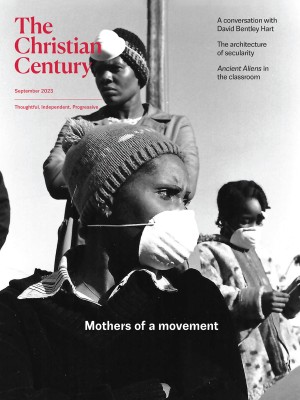September 3, Ordinary 22A (Exodus 3:1–15)
We see what we focus on—and what we focus on determines what we do not see.
The reason Father Robert—not to mention his dog—lived to a ripe old age was my friend Sister AJ’s observational skills.
Every afternoon, Father Robert took a thermos of coffee and his little dog, Pugsley, on a leisurely walk through the woods. Sister AJ rarely joined them. She didn’t much like the dog, and frankly, she accomplished more with Father out from underfoot.
But as the aging priest grew less steady on his feet, Sister AJ began accompanying him. Father was thrilled to have her company, though he tried her patience by stopping every few yards to point out a particular flower, a certain rock, the tracks of raccoons, and spiderwebs. He often paused in these moments for prayer, his face upturned toward the sun, smiling beatifically, blissfully unaware of Sister AJ dodging poison ivy to chase after Pugsley, who had a habit of wandering off-trail.
Read our latest issue or browse back issues.
One day, priest and nun were out walking when Father Robert paused—again—to consider the lilies and Pugsley paused to anoint the soil. With Father’s eyes closed and Pugsley in a decidedly inelegant position, Sister AJ, standing a few feet behind them, said in a low voice, “Father, pick up Pugsley and walk slowly over here.”
Oblivious to mere earthly matters and perhaps reluctant to interrupt his dog, Father Robert held his hands toward heaven and said, “Sister, sister. Choose the better way of Mary.”
To which Sister AJ said again, this time through gritted teeth, “Father. Pick. Up. Pugsley. And come. Over. Here. Now.”
It’s said that we see what we focus on. It’s equally true that what we focus on determines what we do not see. And that day, neither priest nor Pugsley saw the bear 15 feet away, weighing its odds of scoring dachshund for dinner without getting a snout full of Sister AJ’s bear spray.
When Sister AJ told her friends the story, we all laughed at Father Robert’s characteristic absentmindedness and the obliviousness of his dog, and we congratulated Sister AJ for saving both their lives. She replied, “Are you kidding? If that man and his fool dog hadn’t stopped right then and there, I would have led us straight up to that bear and it would have picked off all three of us.”
What we do and do not see has a lot to do with what we do and do not slow down for. This makes the real miracle of Exodus 3:1–15 not God’s appearance in a burning bush but Moses’ interruption of whatever he was doing long enough to “look and see.”
Moses had led his flock into territory that, unless sheep eat dirt, doesn’t exactly qualify as good pasture. In that arid, treeless expanse, any kind of bush would stand out like a sore thumb. Moses noticing the bush is not really a problem. But turning aside to take a good look and really see? That is genuinely miraculous.
We won’t know what God moments we miss by racing through life. And maybe, in some respects, ignorance is bliss. If the rest of the Exodus story is any indication, there were certainly days Moses kicked himself for not just sticking with the sheep. Then, as now, encounters with the living God had an unnerving way of upturning our lives.
In An Altar in the World, Barbara Brown Taylor tells a story from her youth about taking out the garbage when she passed a scruffy little spot in the yard fantastically transformed by sunlight: “It was like a door to another world. I had to go through it. I knew that if I did, then I would become golden too. But first I had to ditch the [trash] bag.” Ditch it she did, but in the brief meantime, the magical light shifted just enough to return the spot to its former shabbiness. “The garden was no longer on fire. . . . While I made [my task] my first priority, the fire moved on in search of someone who would stop what she was doing, take off her shoes, and say, ‘Here am I.’”
I once had a burning bush encounter while watching a yellowjacket drink from a water droplet on a marigold leaf. In that moment, I sensed God’s love for that scarily weird animal, and I haven’t feared wasps since. This is good, because my work eventually took me to a part of the country where the 747-sized cicada killers—not to mention the barge-sized cicadas—would have sent me screaming back home had it not been for that quiet time with a thirsty bug.
What burning bushes and bears and secret gardens do we miss because we move through life too fast to see, let alone savor, such wonders? Maybe burning bushes happen all the time for those willing to turn aside long enough to truly see what matters to God.





